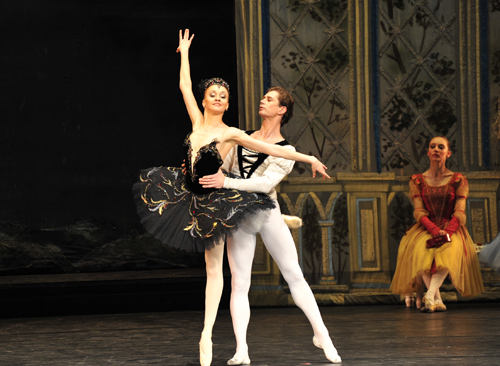
 |
|
Dancers from the Russian National Ballet perform Tchaikovsky's Swan Lake in Guangzhou Opera House on Jan 5. Gao Dianhua / for China Daily |
When celebrated ballerina Galina Ulanova performed in Beijing with the Soviet dance delegation in 1952, she danced Les Sylphides, to the music of Frederic Chopin and Robert Schumann.
The same year, 13-year-old Bai Shuxiang joined Dongbei People's Art Theater, which introduced her to dance.
During those years, famous Russian ballet dancers like Ulanova frequently came to China, and their performances attracted large audiences. In 1956, Bai watched ballet for the first time.
|
|
| Unleashing of a Celtic dragon |
|
|
| Dancing their way to higher education |
"The dancers' special charisma and their physical and spiritual beauty fascinated me. Since then, I have been obsessed with ballet," said Bai, 74.
Born in Xinbin county, Liaoning province, Bai was selected to study at Beijing Dance School - today's Beijing Dance Academy - in 1954, which was China's first professional dance school, established with the assistance of Russian teachers.
It was the cradle of dance in China, and ballet was one of the school's main subjects. Bai was hungry to learn the art and received systematic training under the instruction of Russian dancers.
Russian dancer and choreographer Pyotr Gusev, who was the school's artistic director from 1957 to 1960, had a strong influence on young students like Bai.
"The Russian teachers were very strict about training. They paid attention to all the detailed movements," Bai said. "The training system and even the school system were built on the Russian model."
In 1957, under the instruction and direction of Russian experts, China staged La Fille Mal Gardee (The Wayward Daughter), a masterpiece created in the 18th century. Bai said the ballet was at just the right level for Chinese dancers, and they benefited greatly from the show.
For Chinese audiences, Swan Lake represents Russian ballet. Then premier Zhou Enlai, who cared deeply about ballet's development in China, once asked Gusev whether China could have its own ballet performance. Gusev said yes, and in early 1958, Beijing Dance School started rehearsing Swan Lake.
"It was the first ballet show China had ever had. Everything was the first time, including costumes, lighting and the stage design," she said.
Related:
Tai Lihua lost her hearing at 2 but this hasn't stopped her from achieving her dreams. More...